Chinese New Year Songs
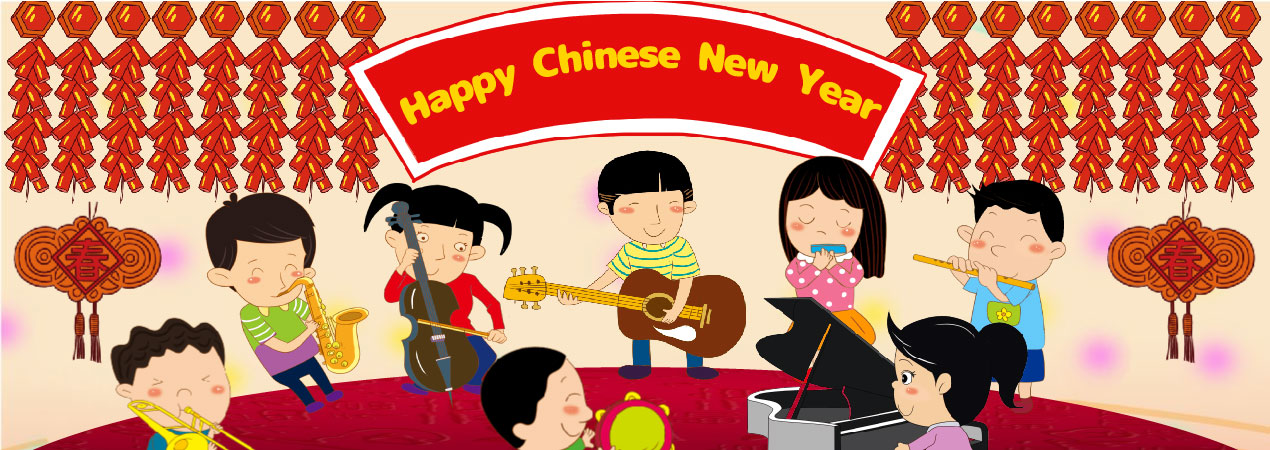
Chinese New Year is the most important festival both in China and also Chinese communities around the world, and it begins with the new moon that occurs sometime between January 21 and February 20 according to Western calendars. The holiday was traditionally a time to honor household and heavenly deities as well as ancestors. Now it is mainly a time to bring family together for feasting.
What Music is Played on Chinese New Year?
In China, the word for 'music', 乐 yuè, is written the same as lè, meaning 'happy'. Music was an important part of the ritual system in ancient China. It is also plays an big part in the Chinese people’s daily life. Music and celebrations always are the supplement of each other.The festival would not be festive without its lucky songs. For decades, catchy tunes with Chinese instruments have been spreading joy and wishing people good health and wealth. Special songs for the New Year include those containing well wishes for others. "Gongxi, Gongxi" means "Congratulations/Good Wishes," "Gong Xi Fa Cai" means "wishing you wealth and prosperity," and "Xin Nian Kuai Le" means "Happy New Year".
The China Central Television (CCTV) Spring Festival Gala (AKA "Chunwan") is the biggest TV event in China, watched by nearly 1 billion viewers in China. Watching the Gala with families on Chinese New Year’s Eve which is a cherished memory of going home. It all ties in with warm moods of going home, reuniting with loved ones, and getting into the festive mood. Many popular Chinese New Year songs were sung on the stage of Chunwan, which is why they are so popular.
Below we list seven songs being played the most during the Chinese New Year holiday.
1. Huan Le Zhong Guo Nian (欢乐中国年 Happy Chinese New Year)
This was sung by Sun Yue as the first song for Chunwan in 1999. The song is widely recognized as a festival classic because of its catchy melody and auspicious lyrics wishing everyone a happy year ahead. It’s been 21 years since the reform and opening up policy was launched in 1978; the Chinese economy is booming. The lyrics expressed that Chinese people are very happy with their life.
The Spring Festival is also called "Guo Nian", which means “pass the year”, but do you know that Nian was once the name of a furious monster that fed on human beings? According to Chinese legend, long, long ago, there was a monster called Nian. It looked like a unicorn with sharp teeth. On the eve of Chinese New Year, the monster would come down from the mountains to hunt people. So people were very much afraid of it and locked their doors early before sunset on the days of its coming. But one wise man found that the monster is very afraid of loud noise and red colors, so he recommended that the villagers beat drums and gongs, burn bamboo, and light fireworks for the purpose of making large noises to threaten the hateful monster. And families also pasted red couplets on their gates. When Nian came, it was so scared to find the red couplets and hear the loud noises, it fled and died of exhaustion. People have kept the tradition alive by beating drums and gongs, and lighting fireworks on the eve of New Year to drive the imagined monsters away and to celebrate the victory over it.
Lyrics: Happy Chinese New Year
金风送喜来紫荆花已开 jīn fēng sòng xǐ lái zǐ jīng huā yǐ kāi
The golden wind sends joy, the bauhinia has bloomed
二月大地春雷锣鼓敲起来 èr yuè dà dì chūn léi luó gǔ qiāo qǐ lái
In February, the spring thunder roars, people beat drums and clang gongs
百年梦已圆千年手相牵 bǎi nián mèng yǐ yuán qiān nián shǒu xiàng qiān
A hundred-year dream has come true
中国走进新时代 zhōng guó zǒu jìn xīn shí dài
China has entered a new era
恭喜恭喜中国年 gōng xǐ gōng xǐ zhōng guó nián
Congratulations to the Chinese New Year
五谷丰登笑开颜 wǔ gǔ fēng dēng xiào kāi yán
Good harvests, there are smiles on everyone’s face
恭喜恭喜中国年 gōng xǐ gōng xǐ zhōng guó nián
Congratulations to the Chinese New Year
歌声万里连成片 gē shēng wàn lǐ lián chéng piàn
Songs of happiness and laughter were heard everywhere
欢乐欢乐中国年 huān lè huān lè zhōng guó nián
Happy Chinese Year
欢歌笑声连成片 huān gē xiào shēng lián chéng piàn
Songs of happiness and laughter were heard everywhere
欢乐欢乐中国年 huān lè huān lè zhōng guó nián
Happy Chinese Year
红红火火到永远 hóng hóng huǒ huǒ dào yǒng yuǎn
A Prosperous Life Forever
2. Chang Hui Jia Kan Kan (常回家看看 Come Back Home More Often)
“Come Back Home More Often” was first released in 1999 and on stage of Chunwan of the same year. It quickly became popular in China. With urbanization and economic development in China, more and more countryside people leave their home villages to work as a migrant workers in the cities. Usually the aged parents and young children are left behind; they want to find time to visit their parents and children back home, and the Chinese New year holiday is the best time to do so. The lyrics express how children who are away from home should often visit their parents. In China, family matters far more than anything else and “home” is still very much the place where Chinese people’s hearts are. People travel thousands of miles to go home to get together with parents and grandparents. All of them sit around the table, eating, chatting and laughing. For those who want to but cannot make the trip back home, they must feel that something is missing.
Lyrics: Come Back Home More Often
找点空闲, 找点时间 zhǎo diǎn kōng xián , zhǎo diǎn shí jiān
Spare some leisure time
领着孩子, 常回家看看 lǐng zhe hái zǐ , cháng huí jiā kàn kàn
And take your child go back to your parents' home more often
带上笑容, 带上祝愿 dài shàng xiào róng , dài shàng zhù yuàn
Bring your smiles as well as good wishes
陪同爱人, 常回家看看 péi tóng ài rén , cháng huí jiā kàn kàn
Accompany your spouse to go back home more often
妈妈准备了一些唠叨 mā mā zhǔn bèi le yī xiē lào dāo
Mom has some familiar words to repeat
爸爸张罗了一桌好饭 bà bà zhāng luó le yī zhuō hǎo fàn
Dad has prepared a delicious meal
生活的烦恼跟妈妈说说 shēng huó de fán nǎo gēn mā mā shuō shuō
Confide the worries of daily life to mom
工作的事情向爸爸谈谈 gōng zuò de shì qíng xiàng bà bà tán tán
And relate workplace trivia to dad
常回家看看, 回家看看 cháng huí jiā kàn kàn , huí jiā kàn kàn
Come back home more often
哪怕给妈妈刷刷筷子洗洗碗 nǎ pà gěi mā mā shuā shuā kuài zǐ xǐ xǐ wǎn
Even if you only help mom to wash some dishes
老人不图儿女为家做多大贡献 lǎo rén bú tú ér nǚ wéi jiā zuò duō dà gòng xiàn
Parents don't expect their children to make great contribution to family
一辈子不容易就图个团团圆圆 yī bèi zǐ bú róng yì jiù tú gè tuán tuán yuán yuán
The only thing they desire is a family reunion
常回家看看, 回家看看 cháng huí jiā kàn kàn , huí jiā kàn kàn
Come back home more Often
哪怕给爸爸捶捶后背揉揉肩 nǎ pà gěi bà bà chuí chuí hòu bèi róu róu jiān
Even if you just give a massage to dad
老人不图儿女为家做多大贡献 lǎo rén bú tú ér nǚ wéi jiā zuò duō dà gòng xiàn
Parents don't expect their children to make great contributions to the family
一辈子总操心就图个平平安安 yī bèi zǐ zǒng cāo xīn jiù tú gè píng píng ān ān
They worked hard the whole life, their only aim is a safe and happy life(for the whole family).
3. Kung Hei Fat Choi by Andy Lau (恭喜发财 Wishing You Prosperity in the Coming Year)
This song is sung by Andy Lau, a very famous star in China. Andy Lau personally got involved in writing the lyrics, expressing the hope that the world will stay peaceful, and bad things won't happen in the future, so that everyone has a happy New Year. Many people associate this phrase with Chinese New Year, but "Kung hei fat choi" doesn't mean "Happy New Year". The greeting is frequently used at this time of year but it actually delivers a wish for prosperity to the person you say it to. It is regularly used as a seasonal greeting in professional environments. "Kung hei fat choi" is the Cantonese way of saying the phrase and in Mandarin Chinese, it's "gong xi fa cai" (pronounced "gong she fa tsai"). Read more on Chinese New Year Greetings - How to say "gong xi fa cai" in mandarin & meaning.
4. Cai Shen Dao (财神到 God of Fortune Has Arrived)
To some people, great wealth equals happiness – that’s literally the meaning of the New Year greeting Kung hei fat choi.
Cai Shen or the God of Fortune / God of Prosperity is one of the most popular pantheons among the Chinese community. His popularity is due to his primary duty as an accountant guarding all the treasuries of heaven. He is also able to bestow fortune to suitable candidates on earth. His birthday is on the 5th day of the Lunar New Year. Cai Shen is depicted riding a black tiger and holding a metallic rod as his weapon. Chinese people in the countryside still paste fortune god posters at the door to usher in good luck and good fortune.
5. Gong Xi Gong Xi (恭喜恭喜 Congratulations)
"Everywhere on the streets,
The first phrase from people’s mouths
When meeting is congratulations,
Congratulations, Congratulations, Congratulations to you!"
Among the numerous Chinese New Year songs sung all over the world, none is more popular than the classic 'Gong Xi Gong Xi' tune. You may be surprised to learn that the song wasn't even intended for Chinese New Year in the first place!
Actually, it was created by the well-known composer Mr. Chen Gexin to celebrate China's victory and liberation following Japan's defeat at the end of the Second Sino-Japanese War (World War II) in 1945, which is one of the darkest marks in China's history.It was the biggest war in Asia during the 20th century, claiming the lives of 35 million people in China. It was also during this war that the terrible Nanking Massacre took place, taking away over 300,000 lives, most of whom were civilians.
The song's title – 'Gong Xi Gong Xi' – is also a well-known greeting during Chinese New Year. The lyrics of the song also celebrate the coming of spring, which also symbolizes bringing the hope for the coming year. So the song has been a big hit during Chinese New Year and has remained an integral part of the holiday music scene since the 1950s.
6. Xin Nian Hao (新年好 Happy New Year)
Xin Nian Hao means “Happy New Year”. It is a children's song for New Year, and most Chinese kids are familiar with it. The lyrics are very simple and very easy to learn. We have attached the lyrics below:
Happy New Year! Happy New Year!
Happy New Year to you all!
We are singing; we are dancing.
Happy New Year to you all!
Happy New Year! Happy New Year!
Happy New Year to you all!
We are singing; we are dancing.
Happy New Year to you all!
7. Hao Yun Lai 好运来 (Good Luck / Good Fortune / Opportunity Knocks)
Apart from being a time to reunite with family, the Chinese New Year celebration is often accompanied by a bunch of customs and rituals. Anyone can incorporate these traditions to welcome the New Year and hope for good luck. The most popular tradition is giving lucky money. People put cash in decorative envelopes that are usually given from adults to children and from married couples to their kids, unmarried family members. Chinese people do everything during the festival in the hope that it will bring good luck to their loved ones and themselves. No wonder that “Hao Yun Lai” (good luck, good fortune) is one of the most played songs during the Chinese New Year celebration.
Other than songs, some pure music is played at happy occasions. The following three are the most popular ones.
1. Xi Yang Yang (Beaming with Joy)
The late Chinese folk music master Mr. Liu MingyuanIt created it in 1958. Its lively,happy rhythm makes a relaxed and festive mood. It was often played at wedding ceremonies.
2. Jin She Kuang Wu (Golden Snakes' Dance)
Mr. Nie Er, who was best known for his "March of the Volunteers",created this song in 1934. This song is full of joy and cheerful moods and it was played in the closing ceremony of the Beijing 2008 Olympic Games.
3. Hua Hao Yue Yuan (Blooming Flowers and Full Moon)
Inspired by classical string and wind music of South China, composer and conductor Mr. Yi-Jun Huang composed this cheerful music in 1935. It describes the scene of people enjoying the flowers and dancing happily under the moonlight. The music employs as many as 15 kinds of traditional music instruments such as Dizi 笛子 (Chinese bamboo flute), Gaohu 高胡 (a kind of Chinese bowed string instrument), Erhu 二胡 (Chinese two-stringed fiddle) and Yangqin 扬琴 (Chinese hammered dulcimer).
For Chinese people, "Blooming Flowers and Full Moon" symbolizes the beautiful times. That makes it perfect background music during Chinese New Year. It can also be used as a good wish for a newly married couple.
OR
Are you eager to begin your Chinese cultural journey?
Drop us a line and we will promptly connect you with our leading China expert!
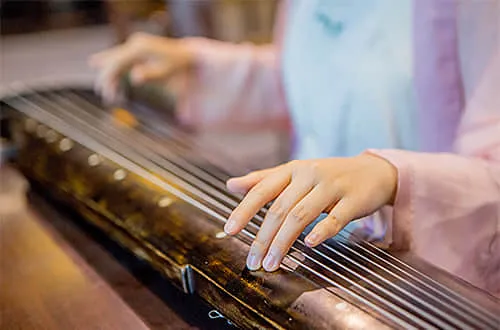 Chinese Music
Chinese Music 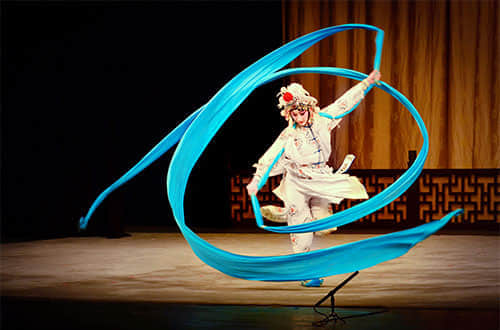 Chinese Operas
Chinese Operas 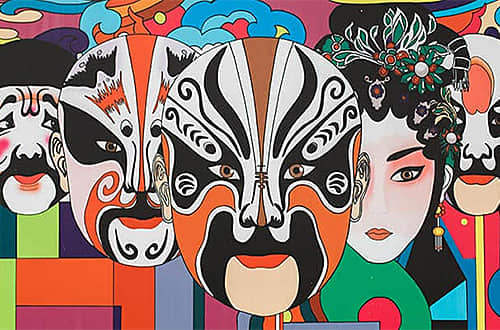 Beijing Opera
Beijing Opera 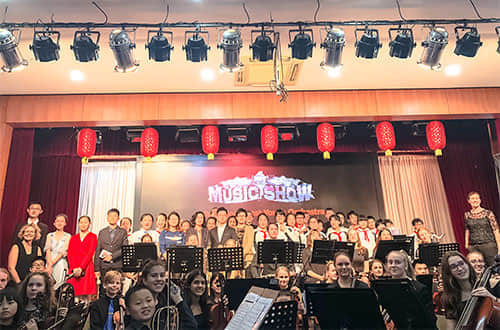 China Music Tour
China Music Tour